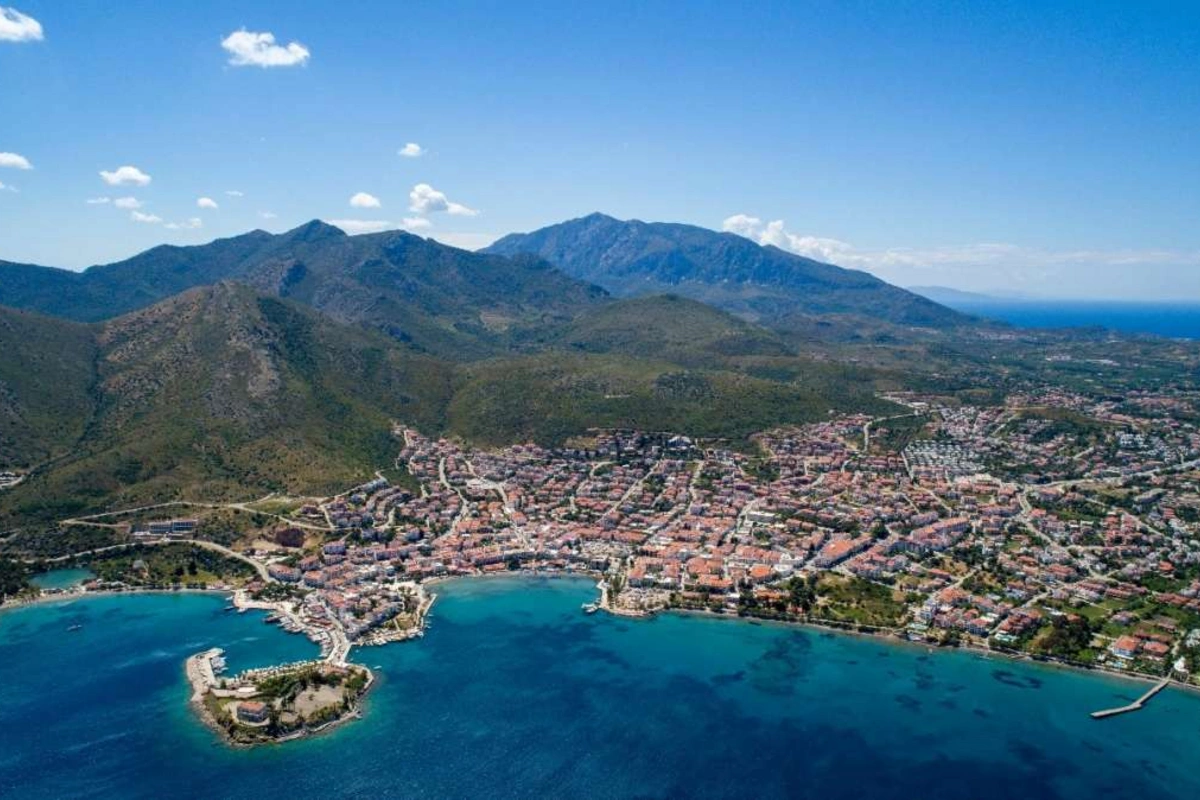
Fires, quakes and party-crazed fellow tourists can’t spoil a family holiday for Azerbaijani blogger Nailya and her family in southern Turkey.
An aerial view of Datcha (not a Dacha), in the region of Mugla, Turkiye. Image: YusufOzluk/Shutterstock
So, we have just returned from three weeks, yes whole three weeks, of family vacation in Turkey.
I know. We were very fortunate to have been able to go anywhere, and most importantly, to return in one piece. I’m sure you heard about the forest fires.
I had not been in Turkey for many years. Last time that my mother and I were planning to meet up she had suggested Turkey. She had wanted to go there for a while. For me, however, it was not on the priority destination list and we ended up in Georgia. The reason, I guess, was that I didn’t find Turkey different enough from Azerbaijan. There were too many cultural and culinary similarities, and going there didn’t feel “exotic” enough. That’s how I would explain my reluctance to spend my precious annual leave days in Turkey.
Nowadays, however, every country has a Covid colour list, and, “coincidentally on purpose,” they never seem to coincide. I.e., if some lovely holiday destination is green on your home country’s list, it does not mean your country is green on theirs. So, you are welcome to go there, but you are not really welcome there. In the end, with not many options, and most importantly, with a very generous offer from my cousin to stay at their fabulous duplex apartment in the middle of the cutest seaside town I’d ever seen, I thought – “fine. Let’s try Turkey. And my mother can also finally spend some time with the grandkids.”
So off we went.
It was an interesting vacation.
First, never in over twenty years of marriage (sounds scary to even type this), has my husband had to spend his holiday with my family. As I was thinking about this, I realized, in a way, that he is quite fortunate. I come from a small family without any serious family commitments or obligations- quite unusual for an Azerbaijani girl. The only person I have in my life who I want to see regularly and take care of is my mother. Other than that, I have two cousins with whom I am close but don’t see much of, and that’s about it.
One of these cousins, who I hadn’t seen for six years, and whom the beautiful apartment in Datcha belongs to, arrived from Canada to spend the holiday with us. She couldn’t stop herself from blabbing away in Russian to my mom in the middle of dinner. In these moments, as my husband threw funny glances at me, I just thought about how lucky he was.
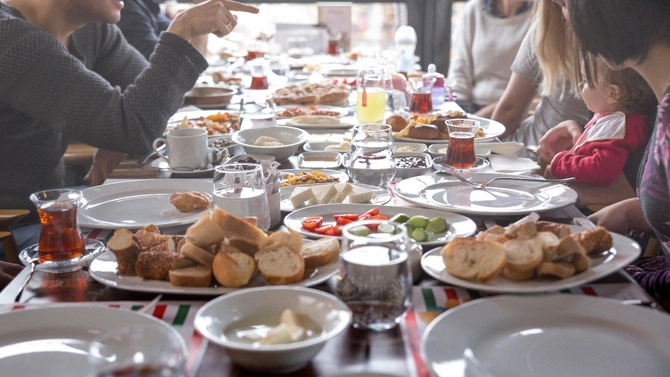
Turkish breakfasts are famous for full tables and endless glasses of tea. Image: BURCU ERDILMEN/Shutterstock
Look, I said, imagine if you had married someone else, someone with a huge, loud extended family with a culture to match. Say, for example, Italian. It would be like they show in movies, everyone sitting at a long table shouting and talking over each other, and on top of that, I would be expected to see them every Christmas and Easter and at a whole lot of other traditional gatherings. In our case, I am always available to attend holidays with his side of the family. That Italian scenario would be painful, I pointed out. Or what about – say - Japanese, with some intricate, complicated culture, where he could have probably gravely offended my great uncle by simply holding a teacup in the wrong way. “Just count your blessings,” I told him. “This is once in twenty years, so you can put up with an occasional barrage of Russian, mixed with Turkish (my cousin’s husband is Turkish) and enjoy your amazing holiday that other people are jealous of.”
My cousin’s husband is extremely hospitable. Every dinner out was a fight over who would pick up the bill. Every morning we came down to find that he had set out a full Turkish breakfast, with eggs, spicy sausage (sojuk), olives, and at least five different cheeses. One thing my own husband was most excited about, which he only discovered in Turkey, was a combination of cold sweet watermelon and stinky cheese (Ezine, made from goat’s cheese). Surprised and impressed at how well that union worked, he indulged in the dish almost daily.
We had stayed in an apartment right in the middle of a town called Datcha. Google photos and my cousin’s stories had misled me. I had imagined that, being a two-hour ferry ride away from Bodrum, this place would be peaceful and idyllic. Now I know the truth. Datcha is anything but peaceful. I had guessed that Bodrum would be packed with annoying tourists.
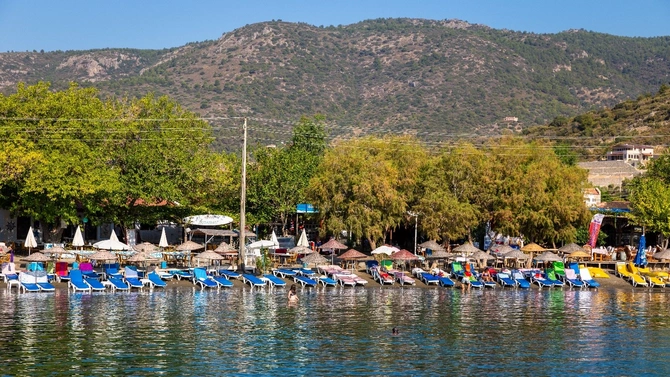
Is that a beach under all those loungers? Visions of Hayitbuku Bay, near Datcha in tourist season. Image: tolgaildun/Shutterstock
Yet, Dacha was also party central. It was so busy that I felt I was somewhere like Ibiza. In the evenings, on the flat’s beautiful view terrace, we could hear music coming from every direction. Some nights there would be a live concert in an open-air amphitheatre that I could see on the opposite side of the bay. See it, and hear it pretty well, too.
Other nights there would be a party in some nearby bar rooftop, or one early evening (much, much worse), a karaoke party of drunken ladies on a huge boat that docked directly in front of our building. Those girls could not sing.
Don’t get me wrong, it was fun people-watching from the balcony, especially whilst sipping an outstanding cherry wine I’d discovered in Shirinje. However, it was a little too touristy for me.
Also, I have never been anywhere in my life on a beach where other people’s children would play right at my feet. Or where street dogs- huge!- would unconcernedly throw themselves under my sun lounger for some shade. I am not against either children or dogs, but when they are not mine, I kind of prefer them to keep some degree of social distance.
One morning, our host mentioned to me quite casually, “Oh! I forgot to mention. Should there be an earthquake, don’t run downstairs. Upstairs is much safer. Just stay there and don’t try (as instinct may tell you) to go outside.”
A…. what?
Quakes were quite common in the area, he repeated with remarkable lack of apparent concern.
And sure enough, we felt small yet unmistakable little earthquakes twice during our trip.
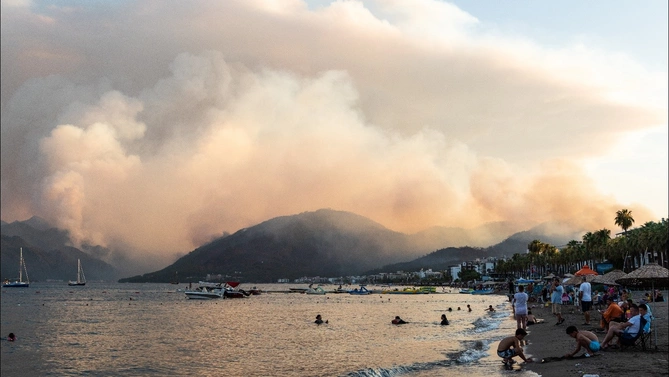
Smoke from the fires. Marmaris, July 29, 2021, just a one-hour drive to Datcha. Image: Alizada Studios/ Shutterstock
Then came the forest fires. Friends kept texting me, asking if I was safe where we were staying. We were in the Mugla region, which, according to my Twitter feed, was on fire, big time. We were also near Bodrum, which, social media told me, was also burning. Of course, according to official Turkish news channels, everything was under control. The opposition media in Turkey, meanwhile, jumped at the opportunity to claim that the government had failed to respond appropriately. In the end, I didn’t have a clue where the fires were or just how big they were. A hot scary wind was howling angrily at night, but was it blowing from a dangerous direction I wondered as I lay sleeplessly in the ‘safer-in-the-event-of-an-earthquake’ bedroom upstairs .
Just like in the 2020 Karabakh war, it was obvious that you cannot rely on the media to know the actual situation. Every piece of news gets politicized and reported in a way that suits that particular side. So even as you are sitting in Turkey itself, surrounded by areas that might be engulfed in flames, you have no real clue just how serious the situation really is. In the meantime, Datcha people kept partying every night and chilling on the beach in the morning.
So there you have it, my report on three weeks in Turkey. Oh - I forgot to mention that the sea was beautiful. Sitting on a large old Gulet that we’d hired for the day, eating fresh fish cooked by the captain of the boat, watching my mother fishing with my little girl, I felt blessed to be there. I was lucky to be able to travel and see my family; and yes, very very grateful. Despite the fires, despite the earthquakes, despite the noise and the very cheeky street dogs, Turkey really did prove worth the trip. We might speak similar languages, and have cultural communalities, but Turkey is not Azerbaijan. I’m sure I’ll go back soon... if not necessarily to Datcha.
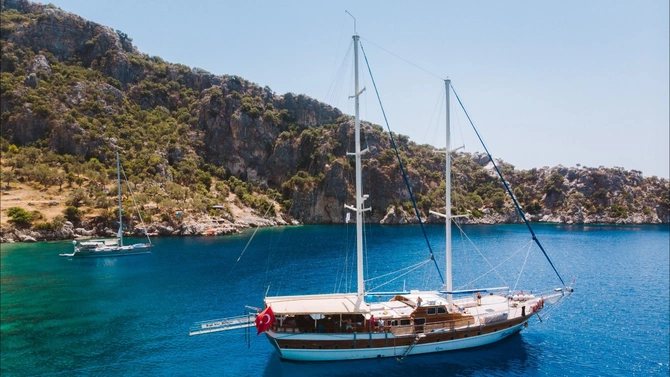
A “gulet” is a traditional Turkish sailboat. In many seaside towns in Turkey, they are available for hire, crew included. Image: Dylan Alcock/Shutterstock
Share on social media